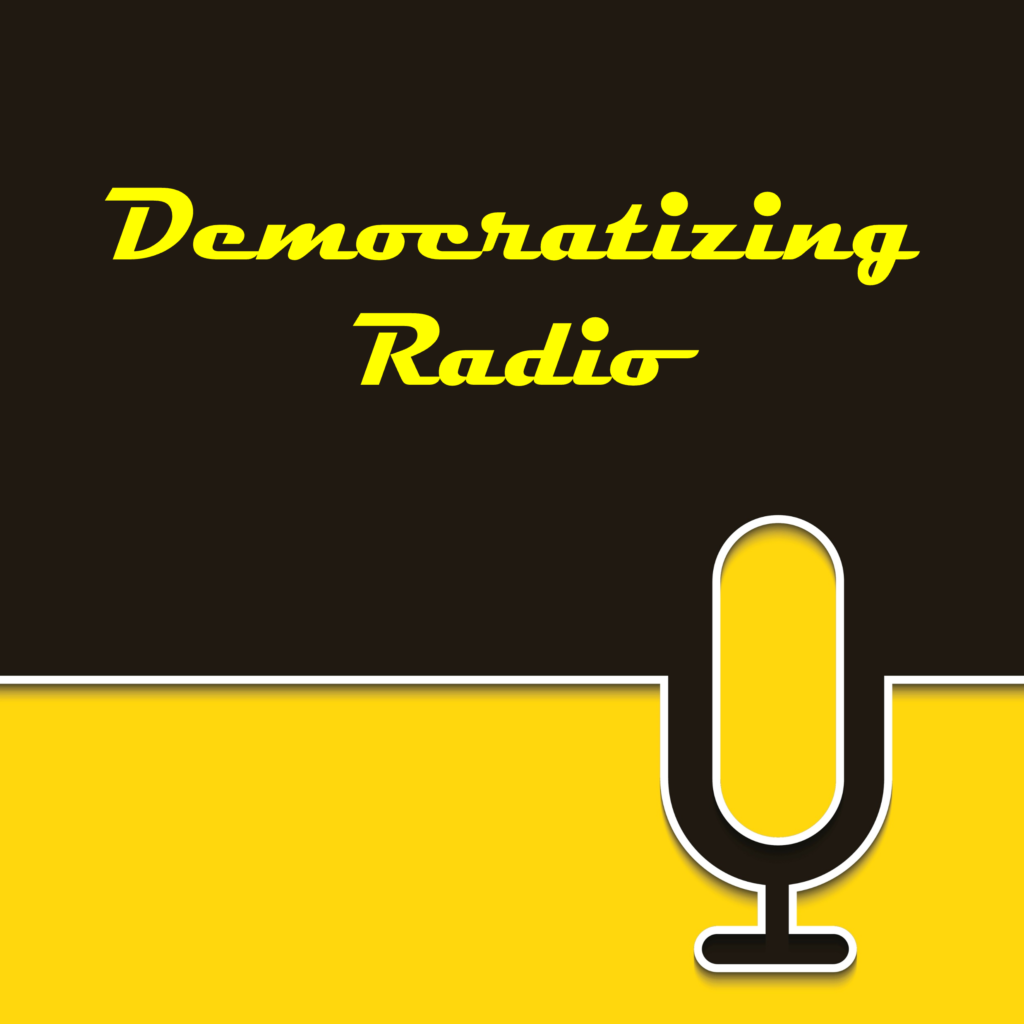
In October last year, I hit “submit” on JacoBLOG, and a lot of you ended up reading that day’s media story. That post – “If Radio Won’t Reinvent Itself, Maybe Someone Else Will” – was about a rumored project from Amazon under the umbrella name, Project Mic.
The actual name of the product was unknown, but The Verge seemed to know quite a bit about what it was designed to do. Their sources revealed Amazon was developing an app that would have the effect of “reinventing radio” by creating a way for anyone with a smartphone to launch a live radio show with music.
Some people were skeptical, of course. After all, the tech highway is littered with failed startups, false promises, and dashed dreams. Most of its big ideas end up losing big money.
But as I reminded at the time, Amazon should be taken seriously. They indeed fail from time to time. I also wrote a post last August about them opening physical bookstores all over the country.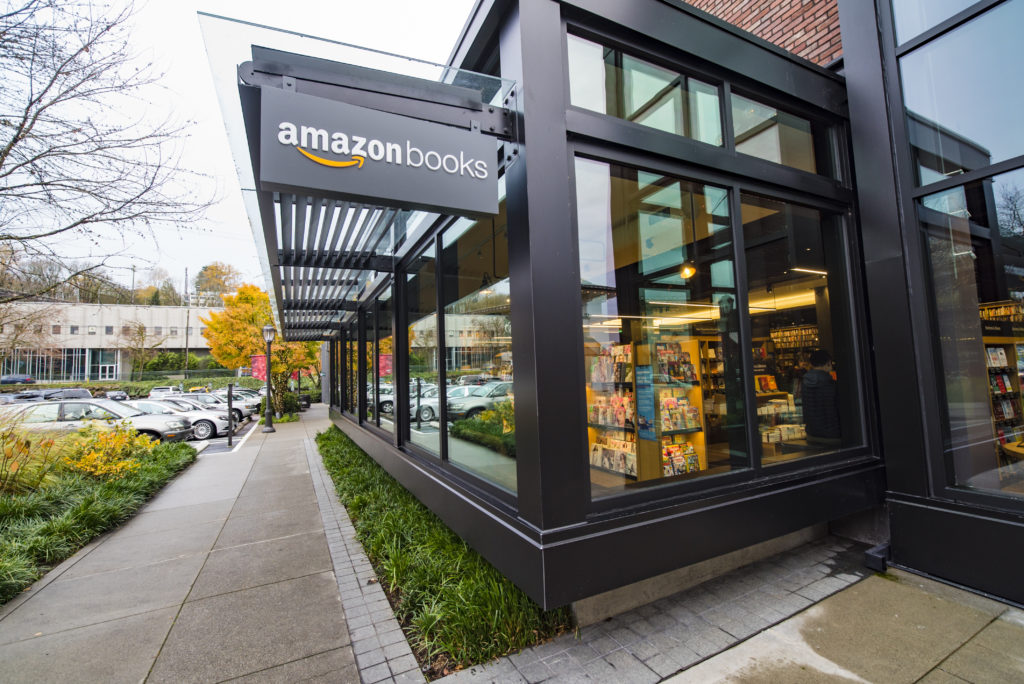
That one didn’t turn out so well. Last week, in fact, Amazon announced plans to shutter all 68 of its bookstores in order to focus on its efforts on its Whole Foods and Amazon Fresh stores. As they say, “fail fast.” Just like that, we’re back to reading books on our Kindles.
Segue to Project Mic, perhaps another of Bezos’ boondoggles. The Verge reported Amazon’s goal was to build a competitor to last year’s big disappointment, Clubhouse. But the line that caught my eye was The Verge’s Ashley Carman’s “take” on Project Mic’s big goal:
“To democratize and reinvent the radio.”
Crazy idea? Pie in the sky? Pipe dream? Another fantastic folly?
Last October, I wrote this warning:
“Don’t laugh. Amazon has already reinvented how we shop, how we purchase and read books, and maybe just maybe how we travel into space. Fixing radio? Compared to Jeff Bezos’ other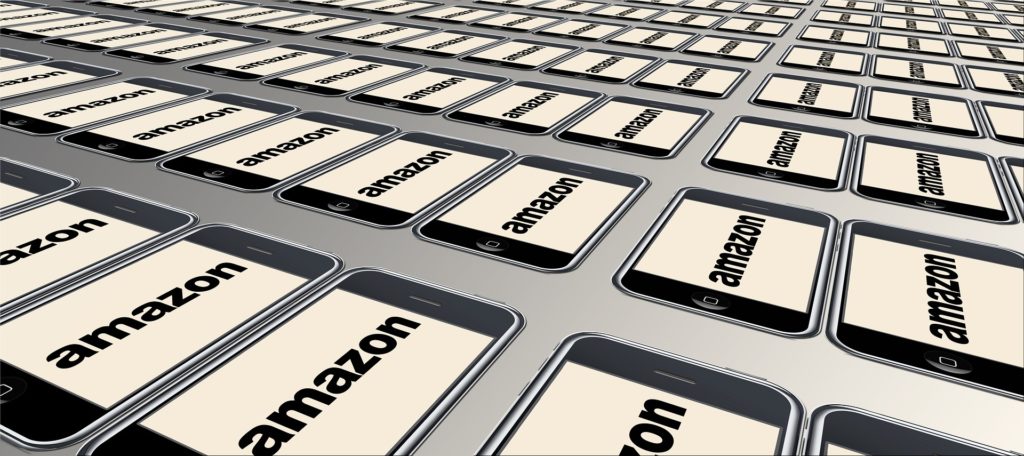 innovations, reinventing radio should be a snap.”
innovations, reinventing radio should be a snap.”
Maybe the idea wasn’t whether Amazon could completely redesign a new architecture for anyone who wanted to be on the radio, but why they would want to. After all, the value of radio stations has plummeted in recent years. When you tell most people you’re in the radio business, many ask, “Does anybody even listen to the radio anymore?”
We know the truth is that millions do, upwards of 90% still tuning in each week. But in a media world where the name “radio” suggests Marconi, the past, “old school,” what is Amazon thinking?
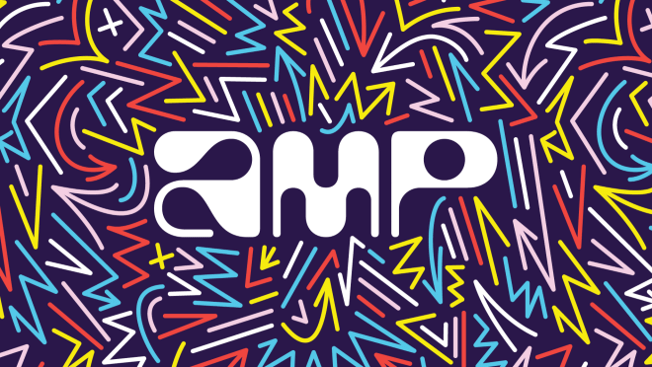 The Verge is back with their analysis: “Amazon launches a Clubhouse competitor that turns everyone into a DJ,” this time by Jacob Kastrenakes. As the stories last year correctly reported, this new app – ironically named Amp – allows any would-be DJ the opportunity to “broadcast,” play music, say anything (no FCC license needed), and even take calls.
The Verge is back with their analysis: “Amazon launches a Clubhouse competitor that turns everyone into a DJ,” this time by Jacob Kastrenakes. As the stories last year correctly reported, this new app – ironically named Amp – allows any would-be DJ the opportunity to “broadcast,” play music, say anything (no FCC license needed), and even take calls.
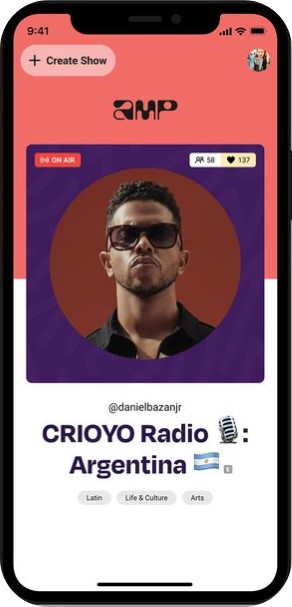
I downloaded Amp on my phone, signed up, but I’m not on the “waiting list” for an invitation to test drive this newest feature that lets me play DJ. But we can already see what a Regular Joe or Joesephine’s Amp Radio station will look like (pictured).
Interestingly, the Amp “airstaff” can only take five listener phone calls, apparently playing the “PPM Game.”
Amazon is wheeling out the star power to make sure young people get the “radio bug.” Nicki Minaj, Pusha T, Tinashe, Travis Barker, Lil Yachty, and Big Boi. If you don’t know these artists, you’re not supposed to. Amazon is going straight to Gen Z with their radio product.
And to add fuel to the Amp Radio fire, they’ve inked some familiar names with a little something to prove to their celebrity lineup – the young phenom Zach Sang (former Westwood One), Kat Corbett (former KROQ), Guy Raz (NPR), and the amazing Christian James Hand.

Every one of these talented radio renegades is a star in their own right, yet another shot across the broadcasting bow.
But the capper is this statement that accompanied Amazon release of the app from John Ciancutti, VP of Amp:
“Radio has always been about music and culture. But imagine if you were inventing the medium for the first time today. You’d combine what people love about radio—spontaneous talk, new music discovery, diverse personalities, and broad programming—with all that’s made possible by today’s technology.
“You’d make it so anybody with a phone, a voice, and a love for music could make their own show. And that’s exactly what we’re doing. Amp makes it possible for you to grab the mic and run the airwaves. We are creating a new version of radio that will have an infinite dial of shows.”
Amp?
Infinite dial?
Radio app?
OK, Amazon. Even us dense radio pros get the message. You’re bringing radio to the masses, so anyone can start up a radio show in their basement…or even in their garage.
Isn’t that what podcasting was supposed to be? A way for any schlub to fire up their phone, plug in a mic, come up with a cool name, and play radio?
Of course, we’ve watched what’s happened to that plan to democratize radio. In 2022, outside of Joe Rogan and a handful of other millionaire podcasters, only those at the top of the pyramid are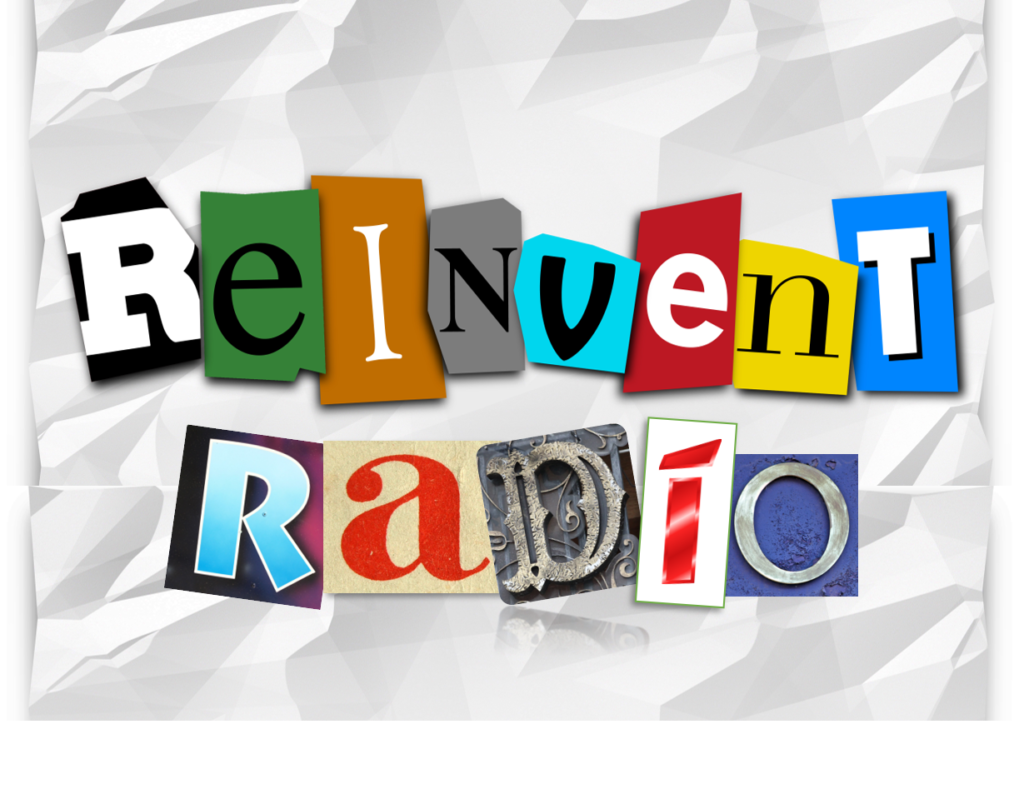 making serious money.
making serious money.
But the bigger question is this dichotomy that Amazon is exploiting – that many people – and yes, young people – actually want to break into radio. They just don’t want to work in our radio.
They want to create their own shows, program their own music, take callers, and maybe even sell air time (no mention of creating your own rate card by Team Amp). Wait until they discover “trade.”
They also are selling the dream of live radio,” something all those podcasters just can’t pull off. It’s one thing to drop a new episode that’s “dated” the moment it uploads “wherever you get your podcasts”; it’s another to crack that mic and GO LIVE.
That’s what Clubhouse was supposed to be. Problem is, there’s no music. Amazon thinks Amp Radio is the solution.
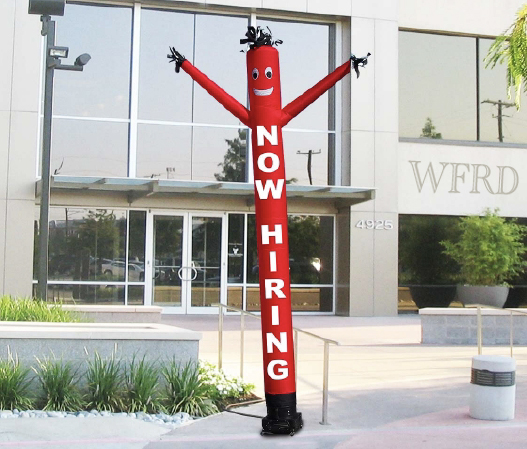 In the meantime, broadcast radio can’t find 20 year-olds willing to intern, pay their dues, work their way up, and eventually get on the air. Even when stations offer to pay the minimum wage – or even higher to one-up all those fast food restaurants.
In the meantime, broadcast radio can’t find 20 year-olds willing to intern, pay their dues, work their way up, and eventually get on the air. Even when stations offer to pay the minimum wage – or even higher to one-up all those fast food restaurants.
Somehow, Amazon is banking on the theory that young people want to play radio – they just don’t want to work at a radio station, at least as a lowly DJ.
The headline in Amazon’s release yesterday may have telegraphed what’s really going on here:
“Run the airwaves with Amp, the live radio app from Amazon.”
Bob, David, Caroline, Ginny, Alfred, and all you other radio CEOS, don’t look now.
These Ampsters may be coming for your job.
P.S. A couple people have pointed out the Amp app is only available on iOS devices – at least for now. Amazon hasn’t indicated when Android devices will be included.
- What To Do If Your Radio Station Goes Through A Midlife Crisis - April 25, 2025
- A 2020 Lesson?It Could All Be Gone In A Flash - April 24, 2025
- How AI Can Give Radio Personalities More…PERSONALITY - April 23, 2025




Nice, but just wondering (pardon me, I’m old)..who pays Sound Exchange, ASCAP, BMI, SESAC, GMR? And, is there an EAS ENDEC app included with AMP?
You have to sign up with Amazon who licenses the music. As for EAS, I’m sure the answer is “no.”
Two thoughts: As you mention there have been many failures on the digital side, even with Amazon. The difference is with Amazon they are willing to invest in new tech and content – something legacy radio isn’t (granted Amazon has an endless supply of capital and can risk failures). What a great line, “Imagine if you were inventing radio for the first time today.” How many times have people working in “traditional radio” heard that, only to know the leaders saying it didn’t mean it. Truth is if you work in traditional radio today, your biases and the leader’s biases about “how things are done” prevent the majority of people from “imagining” how to invent or reinvent radio.
The other thought is the word “still.” Have others noticed how that word is used as an apology for radio? When radio’s reach is discussed, that word is always used, most times by industry leaders. As in, “We know the truth is that millions do, upwards of 90% still tuning in each week.” Until radio stops apologizing, there will continue to be a bleak future.
Darryl, these are great observations. Words matter. And Amazon chooses theirs very strategically. As for “still,” it is a defensive word, and I’m guilty of using it, too. The Amazon release is loaded with positivism and bravado – a couple of ingredients radio people could use.
I am not sure if I understood the concept correctly, so some doubts arise for me:
Will an ordinary person be willing to create a permanent music schedule, 24 hours a day, 7 days a week?
Will him dedicate himself to refresh the music, to take care of music rotations, to maintain a flow between new/old, fast/slow, artist separation, repetition, etc.?
Will him have time to do a daily talk show, even if it’s only 5 or 10 minutes long?
Where is him going to get the material to the program from, how is him going to prep it?
Will he find time to make jingles, promos and other branding material?
Or is it going to be just another music podcast? Spotify is currently offering it…
Until we see the details, Tito, we don’t know. And it will be interesting to see how the celebrity aspect plays out, as well as the “radio renegades” I mentioned in the post. But your question about whether regular consumers will have the discipline to actually build, grow, and maintain a “station,” most won’t.
I was thinking about most of the same questions as Tito did and came to a similar conclusion as you, Fred. (Great minds think alike, etc.)
The appeal of this is similar to the appeal of Live365 that Steve detailed later in the comments. Those who “want their own radio station” are going to be motivated by a desire to program the music THEY want that isn’t on FM. Note how many Live365 “stations” are based on oldies that aren’t a viable format option anymore for those of us with the electric bill for the transmitter. And how many of those “go deep” and play titles that are their personal favorites but eventually drive away any listeners they had?
A lot of Live365 “stations” are on auto-pilot. The system schedules and plays the music based on what the last parameters entered by the stream owner were. No new content … especially no new LIVE content. Once someone realizes that they are putting in a lot of effort, with no compensation, they drift away from the responsibility.
Amp is likely to have the same impact. Amazon is trying to reinvent a wheel which is already running underinflated.
K.M., I suspect you’re right. Most will go frustrated by the amount of effort vs. the return.
I’m not thinking Amazon will solve this problem created by “naarrowcasting.” But I do think they have the resources and the patience to possibly figure it out. And the celebrity/radio star component might be interesting.
We’ll stay tuned.
But n
What really struck me is that Zach Sang’s folks put out a separate (but parallel) release about what they’re positioning as a relaunch of his show (which apparently will also include some repurposed content for YouTube).
This is his quote in that statement: “The democratization of content creation is what humans crave and what has shaped the TV and music industries of today. With Amazon’s Amp, we’re handing the people the power to create and take part in radio like they’ve never been able to before and is going to pave the way for the next generation of radio creators and listeners alike.”
It is interesting Zach published a solo release. It echoes what Amazon is saying so assuming they approved. It will be interesting to see if they can entire young people to try their hand at “radio.”
With my iPhone and an Amp Access Code (they’re not hard to find on Twitter), I’ve checked out the space last night and this morning. The product is clunky in Beta, with transitions between songs taking a second or two of dead air and even more space between songs and talk sets. Since it’s mobile only for now, talk set sound quality suffers. Organization also suffers, with no way to sort broadcasts by genre yet. It’s just an endless scroll, not unlike scanning on a car radio, hoping there’s something you like. But if Clubhouse gives the ability to jump into one of a million Zoom calls on any topic, AMP is like walking into one of a million house parties.
This appears to be worse news in the short term for another Amazon brand – Twitch. With tons of beached air-talent building independent shows and brands there, Amazon might have been better off working out a music licensing deal there. Some of that talent will likely shift to Amp as their primary now and split the usage. Sure, it’s all still Amazon, but why split the family?
Here’s how I see it: how many past and present air-talent got their first taste playing with a low-power set in their garage or on a tape deck? Is Amp so dissimilar for most? This is a great opportunity for the next generation to get their first taste. It’s then up to radio to source/foster this talent and create an environment that makes them want to stay.
Cameron, thanks for taking the dive. I think your last point is especially interesting. It would be wonderful if AMP could be the “bench” broadcast no longer has.
As for the clunkiness, I don’t understand why this stuff doesn’t work better from the outset. This is freaking Amazon! They’ve got the money and the expertise to start off at 95% – not 50%. Given how quickly so many of us give up on tech that doesn’t work the first, why give people a bad experience? The idea of “hacking our way to success” doesn’t hold up well in the real world, especially from a company that knows better.
And regarding Twitch users bailing to AMP, you have to wonder if that will be an unintended consequence of this “beta.”
Thanks for the test drive.
You’re welcome. Had to take it for a spin out of curiosity.
By the way, here’s the killer nobody’s talking about: to play songs on your show you have to have at least one listener. No listeners? Just you talking to yourself until one comes along. Oof.
Or, as Ted Lasso cogently said when his young son asked what “wanker” means, “it’s just a man alone with his thoughts.” Touche.
Wow, that’s worse than the phones not ringing on a talk show. Lots of adlibbing. “Oof” is right.
“ Since it’s mobile only for now, talk set sound quality suffers”
Please clarify are you talking about your suspicions of every source that you’re hearing or is it the device that you’re listening on on the receive side? If the latter, maybe better headphones or speakers would solve it for you or switching to desktop.
I use standard wired Apple headphones for my phone; not superb but not bad either. After more listening and show surfing, I’ve decided that there’s something suffering on Amazon’s streaming side. There’s a fair amount of buffering during songs and a noticeable drop in quality for talk sets (think mid-to-low-quality Zoom). My wifi is more than adequate to handle streaming and casting so it feels like an Amp problem right now.
I keep reminding myself that Amp’s in Beta, so any of this could be improved or entirely changed by ‘full launch’. Maybe they’re not allocating all resources. But at the same time I think, to quote Fred, “This is freaking Amazon!”
Fred, LIVE 365 has been used by many to do this, LIVE 365 pays music royalties but being on the platform costs a bit of money. As for radio there is only 24 hours a day and so many slots to be filled so by its nature its very limited. Its also very programmed unless you are talking community radio. Thus 99% of music lovers will never get a crack at radio. But they can using LIVE 365 and possibly AMAZON. BTW – Money is not the main reason people do Podcasting/Vlogging its the ability to get your message out and build a loyal world wide audience small or large. We live in the era of sharing not hording. This is why YouTube is so massive it’s free content put out by everyday people who know how to fix cars, till the soil or spin the tunes. It’s also a means to create community and push people to your website and meet ups, something legacy radio isn’t designed to do.
Steve, appreciate the info about Live 365 and YouTube.
As for why people do podcasts, I believe it varies. Some are building their brands, some just want to get their thoughts heard, but many think they can make money. That last one is often the sticking point.
also, similar but easier than Live365 is MixCloud. Anyone can create a “show” and upload it for all to hear. MixCloud claims to pay royalties for all music played on their platform. You can view stats (how many listened, who they. were) and promote your “show” if crave more attention. One differentiating aspect about the Amazon app could be Alexa integration – MixCloud doesn’t work on Echo devices at all.
I used SAM Broadcaster to stream my show to my Live365 station. I also use SAM’s stream capturing feature so that I can upload my weekly show to my Mixcloud page. For me it’s a double-win. There’s never a “perfect time” to broadcast a show so those who choose to listen live catch it as it’s happening while others can listen at their convenience.
This does seem so much like many corners of the internet where everyone has a voice, but not everyone has an audience. It’ll be interesting to see how that plays out.
Laurie, maybe you’ve hit on something. Traditional radio was based on getting an “audience”. The fledgling apps and endeavors are seeking to appease people who want their voice to be heard, not really concerned with an audience. You define your own success I guess. If monetizing the “democratizing” of the project isn’t a factor -it’s a pretty interesting hobby.
Laurie, I think your thought is spot-on and applies to some of the other commenters. Many of these channels are accessible to anyone who has a dream of being on the radio. But like the freedom to do a podcast, there’s no guarantee people will find out about it and listen to it. Thanks for the clarity.
Boston College radio station 2nd semester 2021-2022:
So many students submitted good proposals to get on the air – air shifts are now 1 hour to accommodate more students. Every student DJ doing an air shift typically has two interns. Based on what I’ve seen at WZBC, I can verify that this line is dead on: “ young people – actually want to break into radio. They just don’t want to work in our radio.
They want to create their own shows, program their own music, take callers..”
Few to none of these students will pursue jobs in commercial radio. They’re just having a great time sharing their music on their college station purely for fun.
Random thoughts.
1) Some of these shows may actually catch on and Amp could serve as radio’s bench.
2) Radio shows…and even playlists crafted by people with no experience or feel for what other people like usually aren’t very good. In my single days, I got fed up with listening to people’s “party tapes” – complete with the sound of the machine starting, the needle dropping, often bad songs playing, followed by the noise of machine stopping, lather rinse repeat. So I bought two broadcast turntables and a mixing board and made my own tapes. Because I was in radio, I knew what songs to play and because I had the equipment, I was able to do radio segues, so people could dance non stop for the length of the tape. I got WAY more party invites than my social standing should have generated, because they were all followed with, “and could you bring your tapes?”
3) People who know how to entertain – whether its spoken word, music or both generate an audience, people who don’t end up entertaining themselves. I’m not sure what this app will, or is supposed to do for Amazon. WZBC may have more people making shows than listening to them.
Interesting ideas here. It would be a great outcome if Amp could serve as a source of new radio talent. Meantime, do you still have those turntables, and did any of your tapes have Boz Scaggs or Gino Vannelli?
No and no. My kids scavenged my vinyl and what they didn’t want is in storage and the turntables/mixing board were sold when we downsized.
Boz and Gino Yes!!! Thanks to YouTube I can listen to both of their works. Local radio hasn’t played Gino since Black Car and never played his earlier stuff. Ha
Economically this makes a lot of sense. It’s Audio Twitch. It doesn’t matter if it takes 500,000 creators to accumulate 1 million ad impressions. All ad impressions get aggregated and sold programmatically on Amazon’s DSP.
I’ve been podcasting for over a decade, and that’s where I’ll stay for now. To go from one format to another is interesting, but only if the audience is there.
Thank you for the information and perspective. I appreciate you putting together this article on Amazon and emerging radio technologies.
Glad you enjoyed it, Bret Please check in anytime, and thanks for reading our blog.
It’s a catchy concept, letting everyone play “deejay” and music director. Playing whatever you want and saying whatever you want may feed your soul, but it’s a selfish enterprise, and an arrogant one.
You assume your “channel” is going to be instantly popular…in fact, that’s what you want: everyone to validate your taste and opinions by listening. Because you have excellent taste, right? Much better than those “losers” in commercial radio who play the same stuff over and over just because some consultant tells them what’s popular.
But without any kind of research or input from those you want to attract, you’re doomed to fail. There’s a reason why songs are played “over and over” – there are people who actually want to hear them, and the outlets that play them have investigated what makes them do the head nod. And there’s a reason why some songs are not released as singles or promoted to mass media. Their producers know (or suspect) not everyone is going to groove to the tune, even if they love the artist.
You could do your own research to find what makes an audience happy and be a success. But that probably costs more than what’s lining the pockets of the aspiring Amazon air talent.
Or you can just play deejay in your basement with recorded applause.
Dianna, I think your comment is spot-on. Everyone wants to “play radio,” but has no clue about what it takes to amass and loyal audience. As I noted in the post, I think the same conditions largely exist for fledgling podcasters. Thanks for the comment.